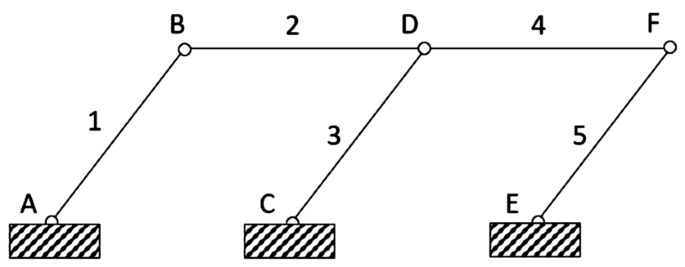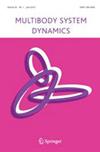Projection continuation for minimal coordinate set formulation and singularity detection of redundantly constrained system dynamics
IF 2.4
2区 工程技术
Q2 MECHANICS
引用次数: 1
Abstract
Abstract The formulation of (possibly redundantly) constrained system dynamics using coordinate projection onto a subspace locally tangent to the constraint manifold is revisited using the QR factorization of the constraint Jacobian matrix, using column pivoting to identify a suitable subspace, possibly detect any singular configurations that may arise, and extract it. The evolution of the QR factorization is integrated along with that of the constraint Jacobian matrix as the solution evolves, generalizing to redundant constraints a recently proposed true continuation algorithm that tracks the evolution of the subspace of independent coordinates. The resulting subspace does not visibly affect the quality of the solution, as it is merely a recombination of that resulting from the blind application of the QR factorization but avoids the artificial algorithmic irregularities or discontinuities in the generalized velocities that could otherwise result from arbitrary reparameterizations of the coordinate set, and identifies and discriminates any further possible motions that arise at singular configurations. The characteristics of the proposed subspace evolution approach are exemplified by solving simple problems with incremental levels of redundancy and singularity orders.

最小坐标集的投影延拓及冗余约束系统动力学的奇异性检测
利用约束雅可比矩阵的QR分解,重新研究了用坐标投影到约束流形局部相切的子空间上的(可能是冗余的)约束系统动力学的公式,使用列旋转来识别合适的子空间,可能检测到可能出现的任何奇异构型,并提取它。随着解的演化,QR分解的演化与约束雅可比矩阵的演化相结合,将最近提出的跟踪独立坐标子空间演化的真连续算法推广到冗余约束。由此产生的子空间不会明显地影响解的质量,因为它仅仅是由QR分解的盲目应用所产生的结果的重组,但避免了广义速度中的人工算法不规则性或不连续性,否则可能会由于坐标集的任意重新参数化而导致,并识别和区分在奇异构型中出现的任何进一步的可能运动。通过解决具有增量冗余级和奇异阶的简单问题,说明了所提出的子空间演化方法的特点。
本文章由计算机程序翻译,如有差异,请以英文原文为准。
求助全文
约1分钟内获得全文
求助全文
来源期刊
CiteScore
6.00
自引率
17.60%
发文量
46
审稿时长
12 months
期刊介绍:
The journal Multibody System Dynamics treats theoretical and computational methods in rigid and flexible multibody systems, their application, and the experimental procedures used to validate the theoretical foundations.
The research reported addresses computational and experimental aspects and their application to classical and emerging fields in science and technology. Both development and application aspects of multibody dynamics are relevant, in particular in the fields of control, optimization, real-time simulation, parallel computation, workspace and path planning, reliability, and durability. The journal also publishes articles covering application fields such as vehicle dynamics, aerospace technology, robotics and mechatronics, machine dynamics, crashworthiness, biomechanics, artificial intelligence, and system identification if they involve or contribute to the field of Multibody System Dynamics.

 求助内容:
求助内容: 应助结果提醒方式:
应助结果提醒方式:


